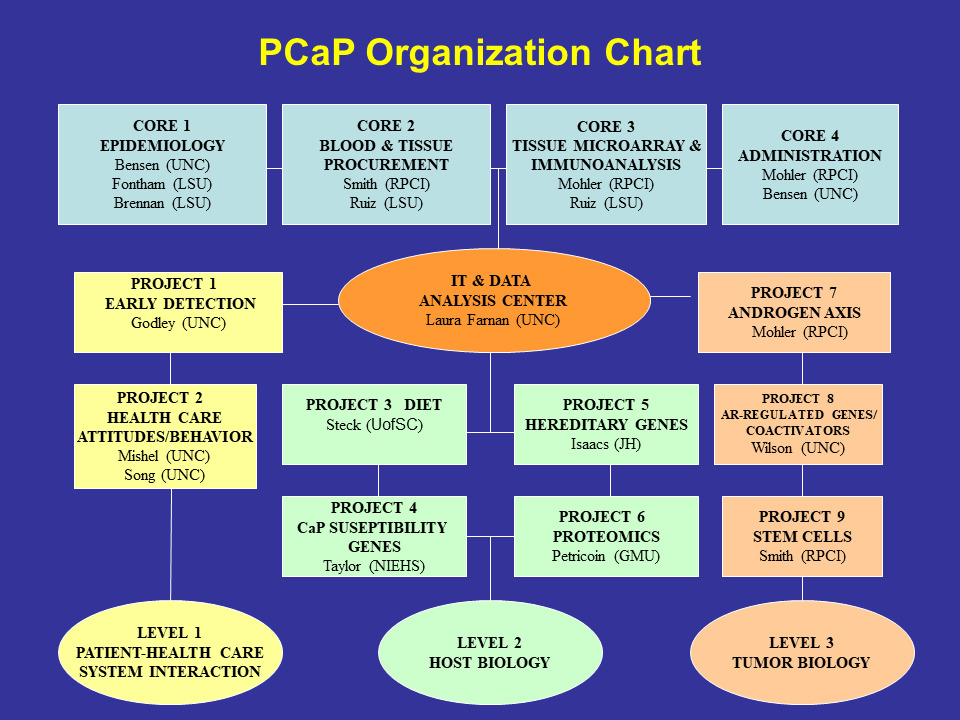
PCaP Design & Methods
Project Descriptions
Project 1, Early Detection, Godley (UNC)
Back to TopRacial differences in prostate cancer screening and care-seeking behaviors. Project 1 evaluates racial differences in prostate cancer screening, diagnosis, and treatment; attitudes towards health maintenance and related behaviors; and attitudes and behaviors related to the use of health care services. Most recently, Project 1 investigators have completed analyses focusing on factors contributing to patient satisfaction and adherence to consensus guidelines for treatment. Ongoing work focuses on the association between guideline concordance and longer-term health-related quality of life, and a grant proposal has been submitted to evaluate this and other issues of long-term follow-up with the NC cohort.
Project 2, Health Care Attitudes/Behavior, Mishel (UNC)
Back to TopCultural and demographic predictors of interaction with the health care system and prostate cancer aggressiveness. Project 2 examines traditional health beliefs, religious beliefs and participation, physician trust/mistrust, perceived racism, and literacy in relation to racial differences in healthcare interactions and prostate cancer aggressiveness.
Project 3, Diet, Fontham (LSU)
Back to TopNutritional modulation of prostate cancer aggressiveness. Project 3 estimates dietary intake of carotenoids (e.g., lycopene), tocopherols and other vitamins, heavy metals (selenium, zinc, lead), flavonoids, omega-3 and -6 fatty acids, and medicinal herbs (e.g., saw palmetto) using the NCI Diet History Questionnaire (DHQ) [34] and bioassays of blood, adipose, and toenail samples.
Project 4, CaP Susceptibility Genes, Taylor (NIEHS)
Back to TopGenetic determinants of prostate cancer aggressiveness. Project 4 estimates associations between prostate cancer aggressiveness and common polymorphisms in DNA repair and related genes.
Project 5, Hereditary Genes, Isaacs (JH)
Back to TopFamilial prostate cancer susceptibility genes. Project 5 examines genetic variation in hereditary prostate cancer susceptibility genes (e.g. HPC8) in association with race, family history, age of onset, and prostate cancer aggressiveness.
Project 6, Proteomics, Petricoin (GMU)
Back to TopProteomic analysis of the prostate cancer host. Project 6 measures proteomic signatures of low molecular weight serum proteins (determined using MALDI-TOF and SELDI-TOF) to identify profiles associated with prostate cancer aggressiveness, determine the impact of diet on serum profiles, and identify profiles characteristic of African American and Caucasian American patients.
Project 7, Androgen Axis, Mohler (RPCI)
Back to TopThe androgen axis in prostate cancer. Project 7 investigates differences in androgen receptor (AR) protein levels between African Americans and Caucasian Americans, and determines whether AR protein levels are associated with prostate cancer aggressiveness (stage, Gleason grade, and serum PSA) and tumor growth rate (based on Ki-67 staining as a measure of cellular proliferation and caspase-3 staining as a measure of apoptosis).
Project 8, AR-Regulated Genes/Coactivators, Wilson (UNC)
Back to TopAndrogen receptor-regulated genes and nuclear coactivators in prostate cancer. Ongoing research related to Project 8 continues to investigate the role of androgen receptor (AR) coregulators in prostate cancer. The focus of research is on coactivators that increase the transcriptional activity of AR. This includes melanoma-antigen-A11 (MAGE-11), whose levels increase in castration-recurrent prostate cancer. MAGE-11 binds the AR FXXLF motif and increases AR transcriptional activity through interactions with p300 and p160 coactivators. In collaborative studies with Dr. David Shapiro, small molecule inhibitors of AR transcriptional activity are being investigated for potential clinical application in arresting the growth of prostate cancer. In collaborative studies with Dr. James Mohler, inhibition by a dominant-negative form of AR was investigated using lentivirus expression in human prostate cancer xenografts. In collaborative studies with Dr. Frank French, CKβBP2/CRIF1 was identified as a multifunctional transcription factor and inhibitor of AR in prostate cancer. The function of MAGE-11 in activation of other steroid receptors is being investigated. Current efforts are to understand the mechanisms that underlie synergistic effects whereby coactivators increase AR transcriptional activity.
Project 9, Stem Cells, Smith (RPCI)
Back to TopThe differential role of tissue stem cells in prostate cancer in African and Caucasian Americans. Project 9 focuses on racial differences in the number, phenotype and population expansion of prostate tumor stem cells (i.e. malignantly transformed derivatives of the adult tissue stem cell) as a prognostic marker of the aggressive phenotype, given that these cells are insensitive to androgen-withdrawal induced apoptosis and refractory to hormonal and chemo/ radiotherapy.




